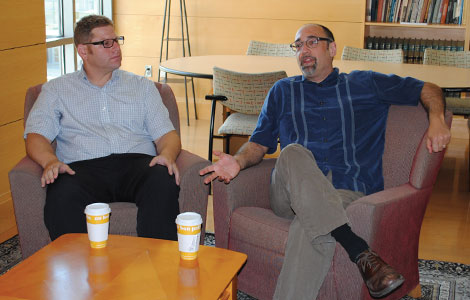In 1999, Giuliano Celenza ’03, sociology, led the UMBC men’s soccer team to its first NCAA tournament. Eleven years later, Levi Houapeu ’11 has done the same thing (and more), leading the 2010 men’s soccer squad to UMBC’s first tourney win at Princeton before suffering a shootout loss at William & Mary. The professional soccer world beckoned Celenza – who is now in his 11th year with the Baltimore Blast – and Houapeu was drafted by the Philadelphia Union of Major League Soccer. These two Retriever soccer standouts recently sat down to talk UMBC and the beautiful game.
What’s it like to make it to the NCAA tournament?
Giuliano Celenza: Back then we were in the Northeast Conference, and we didn’t have that automatic bid. We played in the play-in game. We had to travel to Lafayette to play. We won that game in a shootout to move on. [Then] we had to play the No. 1 team in the country…. We were up 3-1 [on Duke] with 37 minutes left in the game, and we lost 4-3 in overtime. I think making it to the tournament is something I will definitely reflect on my entire life.
Levi Houapeu: As a player, I wanted to complete a certain goal, which was to win the conference and make it to the [tournament]. At the beginning of the season, we faced so much adversity. It’s a credit to the coaches and the players that we were able to overcome it, and once October came, that’s when everything starting clicking, and then we started calling it destiny.
Has soccer’s increased national visibility and the growth of Major League Soccer helped schools like UMBC?
Celenza: Soccer has become really big. That’s good for colleges because you don’t have to go out of the country to recruit good players. They’re here in the States. Houapeu: As a young kid, your dream is to become a professional soccer player. The MLS is pretty much a goal because you want to play for one of the best teams in the world.
Celenza: Back then I think it was tough to get drafted, I think they only had six rounds. My goal was just to play professional soccer, whether it be indoor or outdoor. I was able to pursue my dreams. It’s been a good run for me. To be able to do it in your home state, where you were born and raised, is something phenomenal. I definitely cherish that, and I wouldn’t change it.
What will getting to the tournament and actually winning a game do for the school?
Celenza: It can do a lot. It goes to showing the people in the soccer world that UMBC is capable of beating a No. 10 seed in Princeton. Winning in the first round of the tournament is big; it’s big for the school. All of the soccer alumni see it, and they cherish that, knowing: “Hey, my alma mater! They’re up there! They can play!”
Houapeu: UMBC is one of the up-and-coming schools in the country. UMBC is becoming known [in athletics] as well. If you look at the swimming team, the soccer team, the lacrosse team – there are many sports here that are growing [in stature]. It shows the school spirit as well. If you look at the [men’s soccer] game that was played on national TV, you could see the support from the student body.
Have you ever seen the other play, and how would he do on your UMBC team?
Houapeu: I’ve seen the 1999 highlights, and I saw the Blast on TV. Giuliano would be the best [on this team]. He’d help us a lot. He was really quick with the ball, and his ability to finish in front of the goal was amazing. He’s a tremendous player.
Celenza: Levi’s a great player. Very dangerous on the ball, probably one of the best dribblers I’ve ever seen. Feisty little guy. Obviously, we’re both tiny so we have to be feisty. He’s a good finisher. If he keeps his head and works like he’s been working and puts his mind to it, I think the sky’s the limit for him He definitely would have helped our team. He can help any team.
— Jeff Seidel ’85
Tags: Winter 2011

